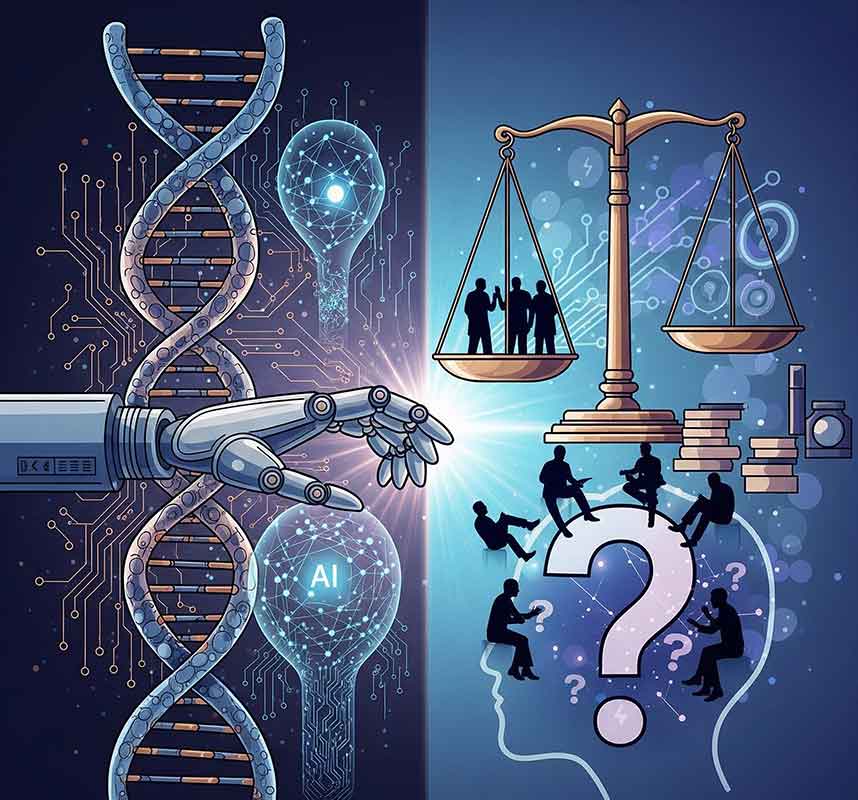Paved with Good Intentions: Ethical Concerns of Scientific Advancements
By Jason Scott – Japanese researchers at Mie University have unveiled a stunning breakthrough, eliminating the extra chromosome responsible for Down syndrome in lab-grown human cells, a development hailed as a leap towards transformative treatments.
As Catholics, we rejoice in science’s power to heal, yet this milestone begs a critical question: Could such advancements, however well-intentioned, lead us into the moral quagmire of eugenics, where human worth is measured by genetic ideals rather than divine truth?
The Church, rooted in the wisdom of the Catechism and Vatican II’s Gaudium et Spes, teaches that scientific progress must serve human dignity and respect the sacred order of creation. Technologies like CRISPR-Cas9 promise to alleviate suffering, but they also risk reviving eugenics-like thinking. By prioritising “perfect” traits, we could unwittingly foster a culture that devalues those who don’t fit secular standards—those with disabilities, for instance, whose lives bear unique witness to God’s love. Their presence among us, far from a flaw, reveals the humility and joy that reflect the Gospel’s call to embrace every soul as a gift.
This danger looms larger in the rise of transhumanism, a movement that seeks to transcend human nature through technology. Tech entrepreneur Bryan Johnson, a prominent advocate, declared in an interview, “We were told stories of God creating us, and I think the reality is that we are creating God. We are creating God in the form of super intelligence.” Such claims aren’t merely bold; they echo the ancient temptation to supplant God, presuming humanity can engineer its own divinity. From a Catholic perspective, this vision distorts our identity as creatures made in God’s image, with souls ordered towards eternal communion, not technological supremacy. Saint John Paul II, in his 1995 encyclical Evangelium Vitae, warned, “When man usurps the power of the Creator, he ends up losing the sense of his own humanity.” This insight challenges us to guard against technologies that prioritise control over reverence for God’s design.
Safeguarding the dignity of every life
Consider the stakes: If we redefine humanity by what we can engineer, we risk losing sight of what makes us human—the imago Dei that no laboratory can replicate. The Church’s teaching in Dignitas Personae is unequivocal: Genetic interventions must never treat persons as means to an end but must safeguard the inviolable dignity of every life, from conception to natural death. This principle is echoed in the wisdom of Saint Thomas Aquinas, who in his Summa Theologiae reminds us that human actions must align with the natural law, which reflects God’s eternal law. To manipulate the human genome in ways that prioritise utility over sanctity risks violating this order, treating the person as an object rather than a subject of divine love.
Further, the Church’s magisterium offers robust guidance for these complex times. Pope Benedict XVI, in his 2008 address to the Pontifical Academy for Life, emphasised that “the dignity of the person must be recognised in every phase of existence, and this includes the moment of conception, where the human being already possesses the full spiritual dignity of a person.” This teaching directly applies to genetic technologies, which, if misused, could reduce embryonic life to a mere resource for experimentation. The Church does not oppose science—indeed, it has long championed reason as a path to truth—but insists that it be tempered by moral clarity. Gaudium et Spes further clarifies that technological progress must foster authentic human development, promoting solidarity and the common good, not a fragmented society where only the “genetically enhanced” are valued.
Wisdom of the Church
The wisdom of Saint Augustine, another Doctor of the Church, offers further insight. In his City of God, he reminds us that human pride, when unchecked, leads to a rejection of God’s order in favour of self-glorification. Transhumanist aspirations to “create God” through superintelligence risk this very pride, presuming humanity can surpass its Creator. Augustine’s call to humility urges us to approach scientific advancements with a heart attuned to God’s will, recognising our dependence on divine grace.
As we stand at this crossroads, we must ask ourselves: Are we using science to serve God’s creation or to reshape it in our own image? The answer lies not in rejecting scientific progress, but in grounding it in faith. The Church calls us to a prudent discernment, ensuring that each step forward respects the sacredness of life. Let us pray for the Holy Spirit’s wisdom to guide scientists, ethicists, and policymakers, that they may avoid the errors of eugenics and uphold the dignity of every soul. Support The Southern Cross to continue shedding light on these vital issues, bringing the Gospel’s truth to our communities as we navigate this brave new world.
- What the Pope Said this Week - December 19, 2025
- What the Pope Said this Week Part 2 - December 12, 2025
- What the Pope Said this Week Part 1 - December 12, 2025




